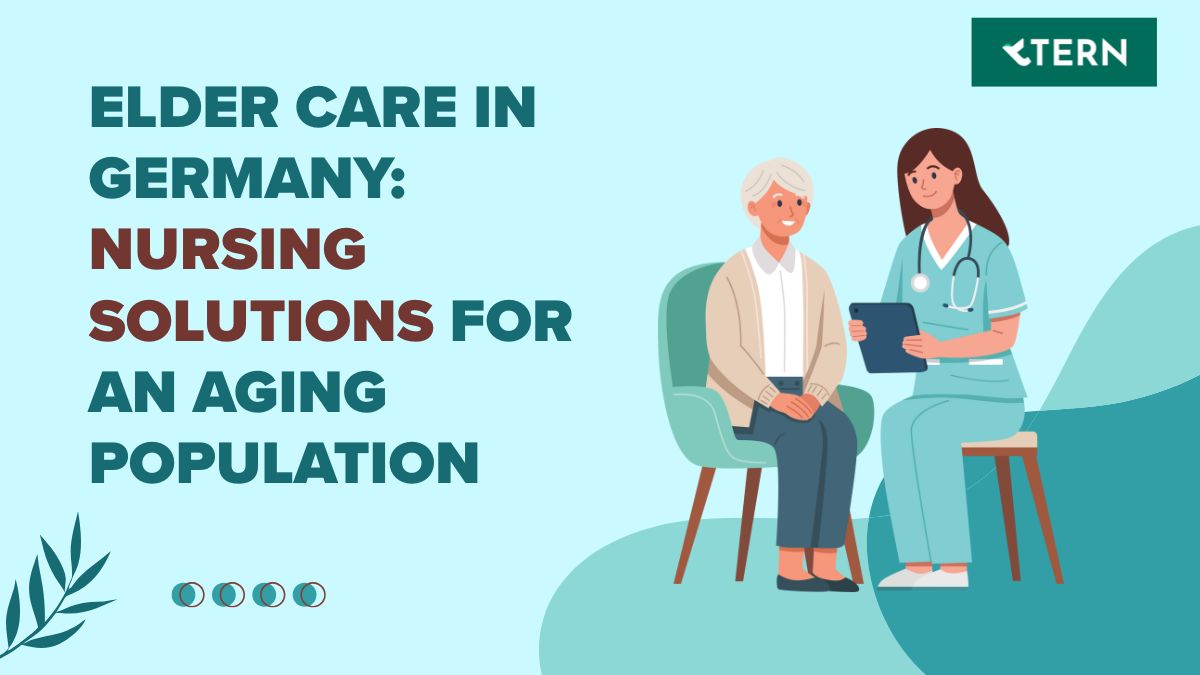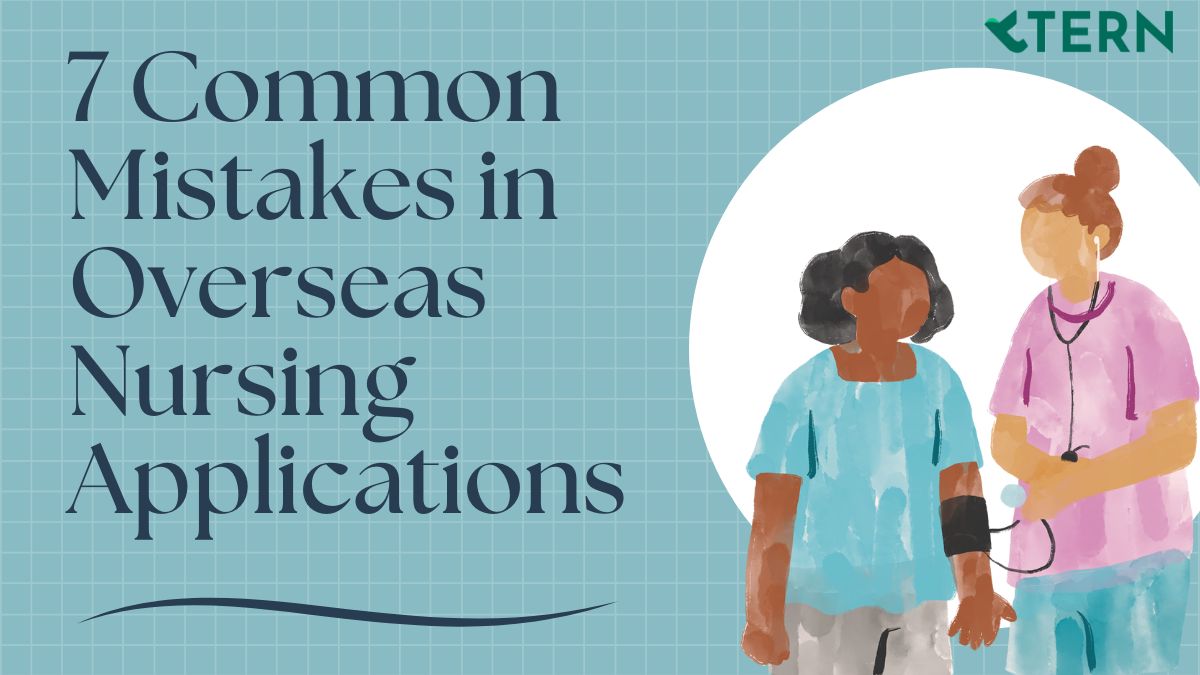Krankenpflege in Deutschland
August 13, 2024
•
Beyond Hospitals: Top Nursing Roles in Germany & How to Qualify

To dive into nursing roles in Germany, one has to first understand how Germany’s healthcare system is a global benchmark for excellence, efficiency, and patient-centered care, making it a top destination for nursing professionals worldwide. While hospitals are often the first workplace that comes to mind, nursing jobs in Germany extend far beyond hospital wards, offering a diverse array of roles that cater to varied interests and skill sets. From elderly care facilities to community health initiatives, these opportunities provide both local and international nurses with rewarding career paths. This comprehensive 1200-word guide delves into:
- The spectrum of nursing roles in Germany
- The qualifications required
- A step-by-step roadmap for international nurses in Germany to qualify for nursing in Germany
With support from organisations like TERN, nurses can seamlessly navigate the process and embark on a fulfilling career in Germany’s thriving healthcare sector.
The Growing Demand for Nurses in Germany
Germany faces a critical shortage of skilled nurses, driven by an aging population and rising healthcare complexities. Recent projections estimate a need for over 150,000 additional nurses by 2030 to meet demand across hospitals, clinics, and community settings. This shortage creates a wealth of opportunities for international nurses in Germany—particularly in non-hospital roles where specialised skills and compassionate care are highly valued. The country’s commitment to universal healthcare, competitive salaries, and robust worker protections makes it an attractive destination. Organisations like TERN are instrumental in helping international nurses in Germany navigate this high-demand market.
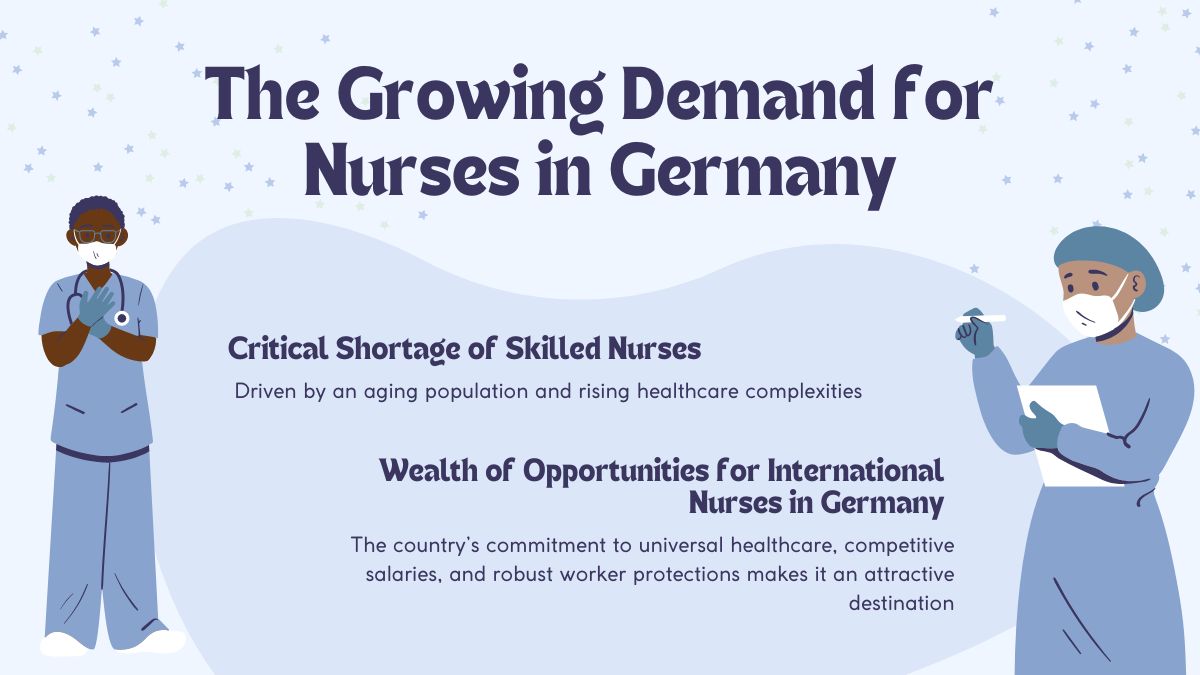
Exploring the Types of Nursing Jobs in Germany
Germany’s healthcare system supports a wide range of nursing roles in Germany, each offering unique responsibilities, work environments, and career trajectories. Below are ten key nursing roles beyond traditional hospital settings:
1. Hospital Nursing: The Core of Acute Care
Hospital nurses work in high-pressure environments such as emergency rooms, surgical units, intensive care, or general wards. They administer medications, monitor patients, and collaborate with specialists. Ideal for those who thrive in fast-paced, technologically advanced settings.
2. Elderly Care Nursing: Supporting an Aging Population
Provides comprehensive care for seniors in nursing homes, assisted living, or geriatric clinics. Focuses on managing chronic conditions and fostering emotional well-being. Perfect for nurses who value long-term patient relationships.
3. Home Care Nursing: Personalized Care in the Community
Delivers medical and personal care directly in patients’ homes. Appeals to nurses who prefer independence and one-on-one interactions.
4. Outpatient and Ambulatory Care: Flexible and Focused
Involves non-emergency treatments like dialysis, chemotherapy, or post-surgical follow-ups. Best for those seeking regular hours and work-life balance.
5. Paediatric Nursing: Caring for Young Patients
Specialises in children’s healthcare, managing vaccinations, monitoring development, and supporting families. Requires strong communication with both children and parents.
6. Psychiatric Nursing: Supporting Mental Health
Works with patients facing depression, anxiety, or schizophrenia in clinical or residential settings. A growing field with high social impact.
7. Public Health and Community Nursing: Promoting Wellness
Focuses on preventive care, screenings, and community health education. Great for nurses passionate about societal well-being.
8. Specialised Nursing Roles: Advanced Expertise
Includes anesthesia, oncology, palliative care, or intensive care nursing. Requires additional certifications but offers higher pay.
9. Rehabilitation Nursing: Supporting Recovery
Helps patients regain independence after injury, surgery, or chronic illness.
10. Occupational Health Nursing: Workplace Wellness
Works with companies to ensure employee health and safety, blending clinical care with workplace strategy.
Qualifications and Requirements for Nursing in Germany
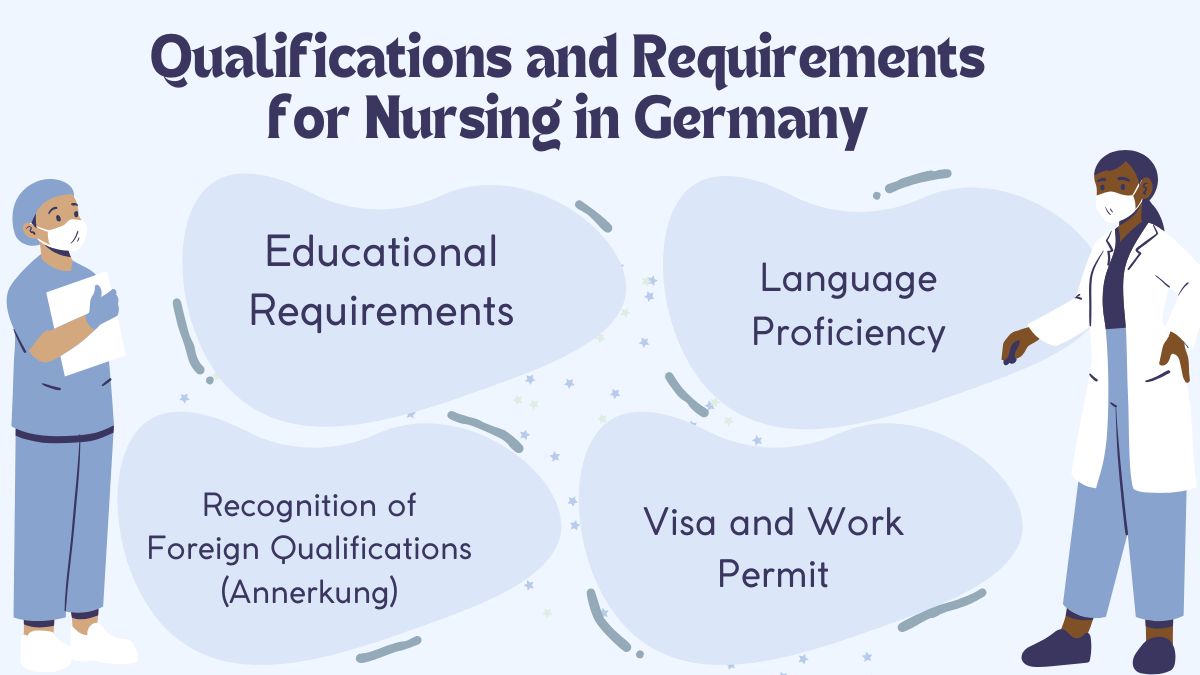
To pursue nursing jobs in Germany, professionals must meet specific educational, linguistic, and legal requirements. Below is a detailed breakdown:
Educational Requirements
- Three-year vocational training or a bachelor’s degree in nursing
- For international nurses in Germany: qualification evaluation for equivalence by the state health authority
Language Proficiency
- Minimum B2 German (some roles require C1)
- TERN offers medical German courses to prepare nurses for the workplace
Recognition of Foreign Qualifications (Anerkennung)
- Submit transcripts, training proof, and professional experience
- May require additional coursework or exams
- TERN guides nurses through this process
Visa and Work Permit
- Non-EU: Work visa (EU Blue Card or healthcare permit)
- EU: Credential recognition still required
- TERN assists with visa applications
Additional Certifications
- Required for specializations such as palliative care or anesthesia nursing
Step-by-Step Guide to Qualify as an International Nurse in Germany
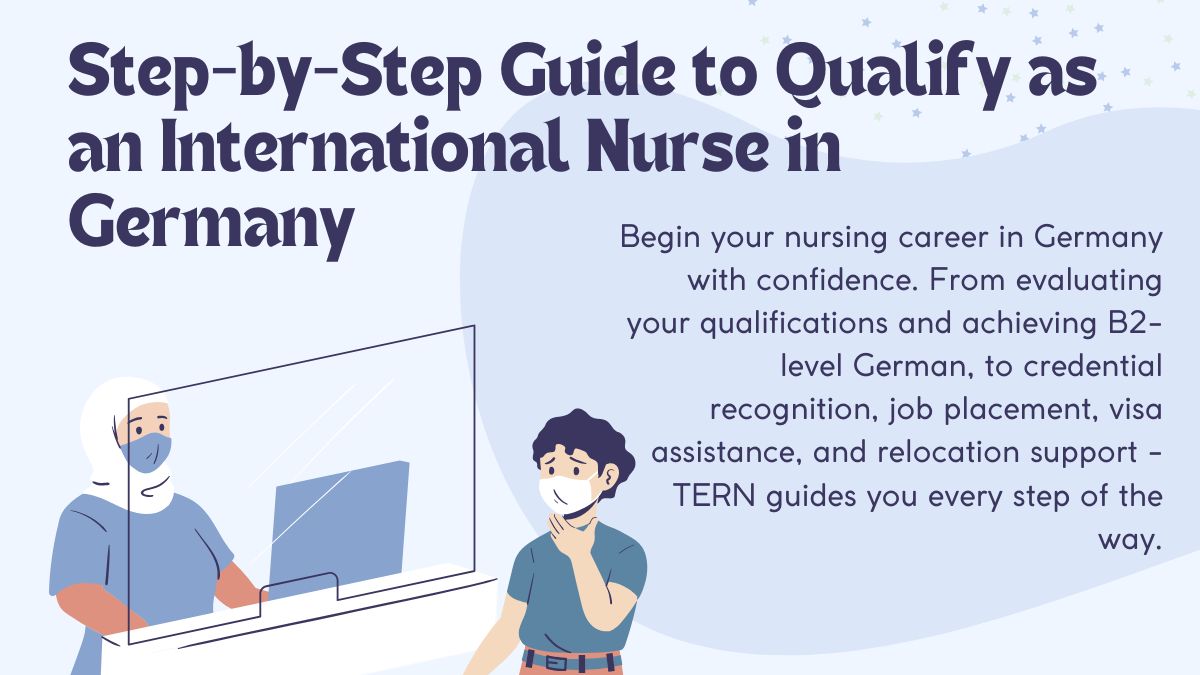
Step 1: Evaluate Your Qualifications
Compare your nursing education and experience with German standards. Contact the relevant state authority or TERN to assess whether your credentials meet requirements or if additional training is needed.
Step 2: Achieve German Language Proficiency
Enroll in a German language course to reach at least B2 proficiency. Focus on medical terminology to prepare for workplace interactions. TERN offers language programs tailored for healthcare professionals, available online or in-person.
Step 3: Apply for Credential Recognition
Submit your documents for Anerkennung, including your nursing degree, transcripts, and work experience records. TERN assists with preparing and submitting paperwork, ensuring accuracy and efficiency.
Step 4: Secure a Job Offer
Once your qualifications are recognized, apply for nursing jobs in Germany through hospitals, care facilities, or agencies. TERN’s network connects international nurses in Germany with employers across the country, matching skills to job opportunities.
Step 5: Obtain a Work Visa
With a job offer, apply for a work visa through the German embassy in your home country. Provide proof of qualifications, language skills, and employment. TERN’s expertise ensures a smooth application process.
Step 6: Relocate and Begin Your Career
After securing your visa, relocate to Germany and start your nursing role. Employers often provide onboarding support, including orientation programs and mentorship, to help you adapt to the workplace. TERN can support every stage—from evaluation to placement.
Benefits of Pursuing a Nursing Career in Germany
Competitive Salaries and Benefits
Nurses in Germany earn between €2,500 and €4,500 per month, depending on experience, specialization, and location. Additional benefits include overtime pay, health insurance, and pension contributions. Specialized roles often command higher salaries.
Work-Life Balance
Germany’s healthcare system prioritizes work-life balance, with regulated working hours, 25–30 days of annual leave, and strong labor protections. Nurses in outpatient or community roles often enjoy more predictable schedules.
Career Development Opportunities
Germany encourages continuous professional development, with employers offering training programs and funding for certifications. Nurses can pursue advanced roles, such as nurse manager or clinical educator, or specialize in high-demand fields.
Cultural and Professional Enrichment
Working in Germany provides exposure to a world-class healthcare system and a rich cultural environment. International nurses in Germany gain valuable skills, broaden their professional networks, and experience life in one of Europe’s most vibrant countries.
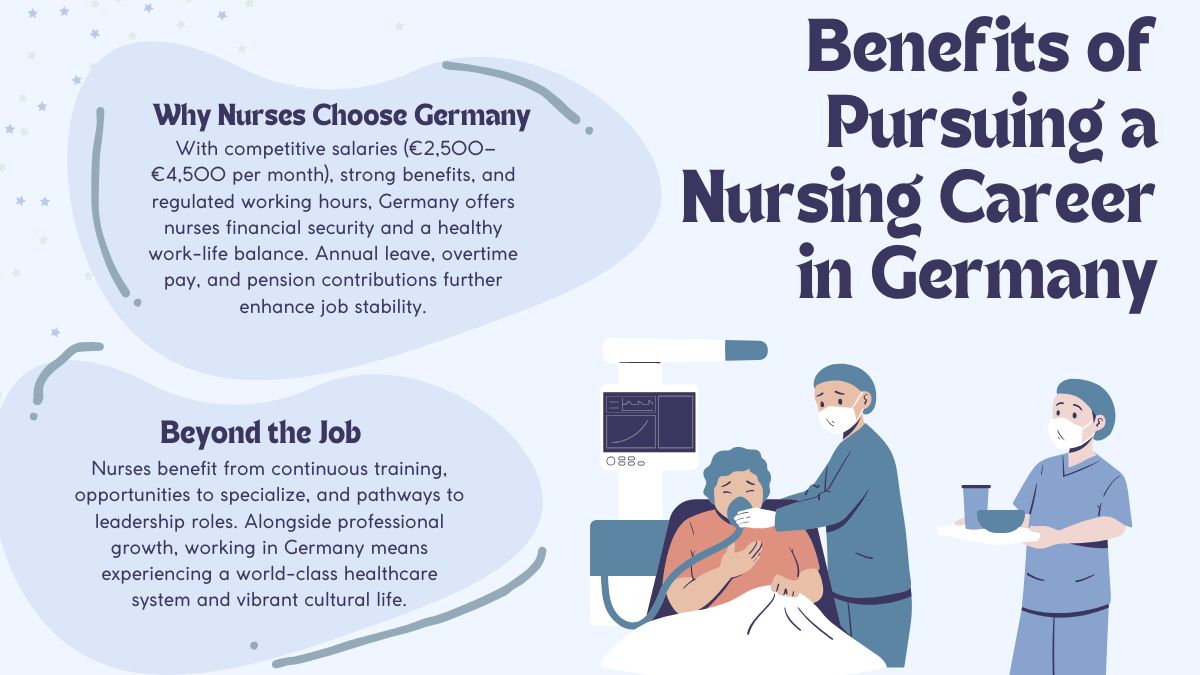
Challenges for International Nurses in Germany
Language Barrier
Learning German to a professional level can be daunting, especially for non-European nurses. However, with structured language programs and support from TERN, this challenge is surmountable.
Cultural Adaptation
Adapting to German workplace culture, which values precision and teamwork, may require adjustment. Understanding patient expectations and healthcare protocols is essential for success.
Navigating Bureaucracy
The Anerkennung and visa processes can be complex and time-consuming. Partnering with TERN reduces the administrative burden, allowing nurses to focus on their career goals.
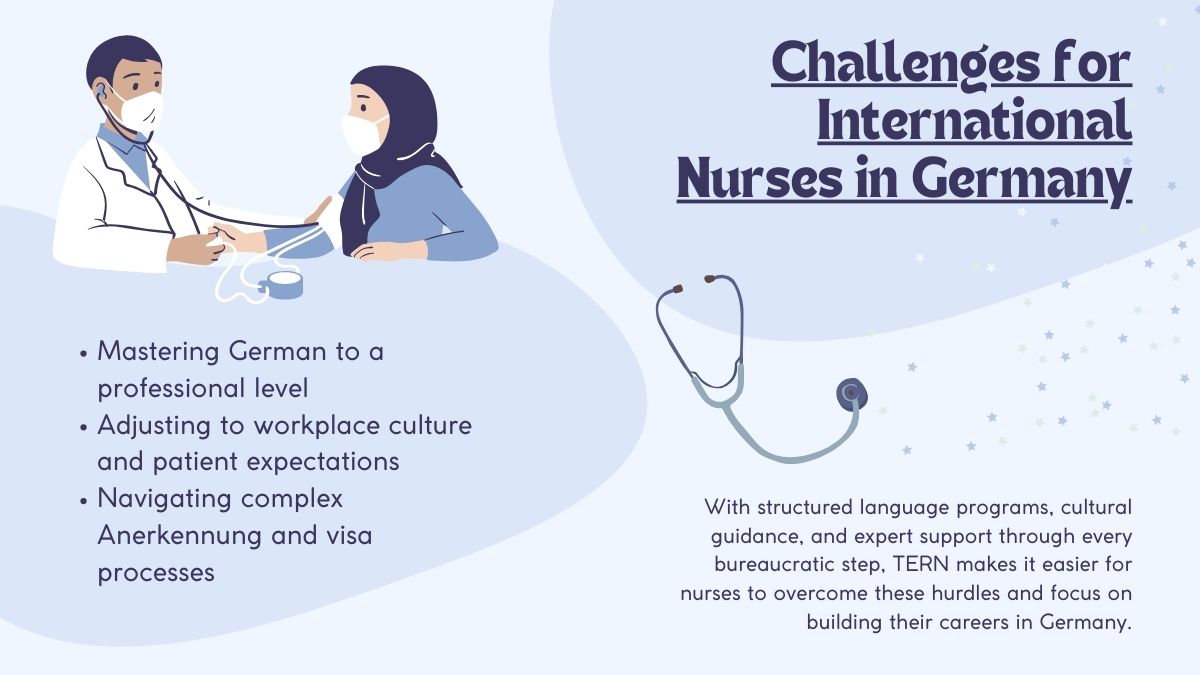
How TERN Can Help You Start Your Nursing Career in Germany
TERN is a trusted partner for international nurses in Germany, offering comprehensive support from qualification recognition to job placement. Their services include language training, Anerkennung assistance, visa processing, and employer connections. By working with TERN, nurses can navigate the complexities of entering Germany’s healthcare system with confidence. Visit TERN’s website to learn more and start your journey.
Conclusion
Nursing jobs in Germany extend far beyond hospitals, offering diverse opportunities in elderly care, home care, pediatrics, mental health, and more. With a high demand for skilled nurses, competitive salaries, and a supportive healthcare system, Germany is an ideal destination for international nurses in Germany. By meeting educational and language requirements and leveraging TERN’s expertise, you can qualify for nursing in Germany and build a fulfilling career. Take the first step today and explore the exciting possibilities awaiting you in this dynamic field.
Additional Considerations for Success
To thrive in nursing roles in Germany, international nurses should stay updated on healthcare trends, such as the increasing use of telemedicine or digital health records, which are shaping the industry. Networking with local nursing associations, like the Deutscher Berufsverband für Pflegeberufe (DBfK), can provide valuable resources and connections. Additionally, understanding regional differences in Germany—such as higher demand in rural areas like Bavaria or Mecklenburg-Vorpommern—can help nurses choose the best location for their skills and lifestyle. With preparation and support from TERN, international nurses in Germany can overcome challenges and seize opportunities in this rewarding profession.
Ready to take the first step?

